Israel Books For Young Readers (Page 2) |
If you wish to purchase any of these books, click on either the title or the book cover to be directed to Amazon.com. As a warning, I have put up pictures of the book covers to give you somewhat an idea of the style of each book (I know, I know. "Don't judge a book by its cover") so the pages may load slowly, depending on the speed of your internet connection.
For videos of the Israeli version of Sesame Street go to the Shalom Sesame Video Page
For history books for older readers go to the Israel and Israeli History Books for Older Readers Page
For Israeli historical fiction for older readers go to the Israeli Historical Fiction Books Page
If this page came up without frames, Click here to see the complete website
Other Pages of Interest:
Israel Books for Children (Page 1) |
(Page 2)
Easy Reader and Picture Books:
Jewish Children's Books (General) |
Jewish Board Books |
Biblical Stories for Children |
Jewish Holiday Books |
Jewish Family Cookbooks |
Folktales and Talmudic Stories for Children |
Jewish Life Books (Mitzvot, Keeping Kosher, etc.) |
Jewish Life Cycle Books |
Family Haggadahs |
Children's Prayerbooks |
Introductory Hebrew Books |
Jewish History and Historical Fiction Picture Books |
Israel Books
Middle School and YA Books:
Bar Mitzvah Books |
Jewish Fiction |
Historical Fiction |
Torah Study |
Prayer and Jewish Life Books |
Jewish Holidays |
Jewish Biographies |
Jewish History Books |
Holocaust Books for Teens |
Israel Books
And More ...
Jewish Books for Children |
Bar Mitzvah Books |
Jewish Parenting Books |
Hanukkah Books |
Jewish Music for Children |
Jewish Videos |
Jewish Toys and Gifts |
Jewish Gift Baskets and Gourmet Food |
Jewish Jewelry |
Amazon.com Coupons, Promotions, and Sales
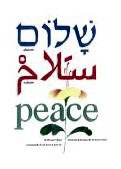
Shalom, Salaam, Peace
by Howard Bogot
An illustrated poem, presented in English, Hebrew, and Arabic,
examining the meaning and benefits of peace.
This unique and beautiful children's book is a poetic, evocative call
for peace in the Middle East - and everywhere.
Description from Publisher
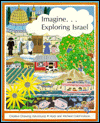
Imagine...Exploring Israel

On the Wings of Eagles : An Ethiopian Child's Story
A Jewish Ethiopian boy recounts the story of Israel's 1991 airlift rescue of his threatened people.
Description from Publisher
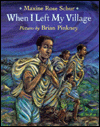
When I Left My Village
This companion to Schur's Day
of Delight follows a family of Ethiopian
Jews (the Beta Israel) in their escape from drought and persecution. Traveling
at night on foot through mountains, plains, and desert, 12-year-old Menelik,
his parents, and younger brother head for a Sudanese refugee camp. From
there, the people are airlifted to Israel; given homes, clothing, and food; and
assimilated into a culture that offers them freedom, safety, and equality. The
boy tells the story of the perilous journeyof days filled with hunger, fear of
discovery, and death; of a furtive border crossing; of weeks of unsanitary
living in the crowded camp; and, finally, of resettlement in a small white hut
in the hills near Jerusalem. The book reads like a true adventure story. Pinkney's
full-page, black-and-white scratchboard illustrations add reality to this
fictionalized account of the recent rescue mission that saved the remnants of
a little-known civilization. A map of the Middle East shows the family's escape
route, and an author's note adds historical information.
Description from School Library Journal
Winner of The Sydney Taylor Award (The Association of Jewish Libraries)
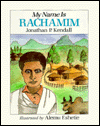
My Name Is Rachamim
Rachamim and his family, Jews suffering from discrimination in Ethiopia,
are forced to flee the country and finally make it to a new home in Israel.
Description from Publisher

And Shira Imagined
As Shira and her parents travel around Israel, her parents remind her of the
significance of each site, which she interprets in her own way: when told
that busy, modern Tel Aviv was only sand and dust 80 years ago, Shira
pictures herself and some toy-like creatures building sandcastles; when
she hears that the old fortress, Masada, was the place where the Jews
clashed with the Romans, Shira imagines a playful battle. A historical
theme is not strictly adhered to; at one point her parents point out the
Red Sea, saying, "Just imagine, we'll be looking at thousands of fish and
swimming with them.'' In the final frame, Shira envisions her bedroom back
in America, where the cast of her imagination awaits herher toys.
Black-and-white pictures of modern Israel alternate with the full-color
fantasies. The language of the telling is simple and straightforward; this
complements the elaborate pictures from Carmi's own fanciful imagination.
Description from Publisher's Weekly
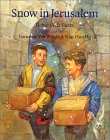
Snow in Jerusalem
By Deborah Da Costa
In her affecting but message-driven debut children's book, da Costa relays the story of
two boys who live in Jerusalem's Old City Avi in the Jewish Quarter and Hamudi in the
Muslim Quarter. A fluffy white cat wanders between the homes of the two boys, relishing
the scraps each feeds her. Then weeks pass without any sign of the cat, alarming each boy.
Looking skinny and dirty, the cat at last visits Avi, who then follows her to Hamudi's
neighborhood, where the youngsters begin to argue, each claiming the cat is his. As a
rare snowfall begins, the boys stop bickering and, fearing that the beloved animal will
freeze, follow her through Jerusalem to a dark alley where they discover four kittens in
a box. As the mother purrs loudly and rubs against the boys, they conclude, "She does not
want us to fight.... She wants peace." The watercolor art by this husband-and-wife team
(Mei-Mei Loves the Morning) balances precise, close-up portraits of the boys with softly
focused backgrounds that depict the various cultural nuances of the setting. A glossary
defines the Hebrew and Arabic words integrated into the text.
Description from Publishers Weekly
Although this story is set in contemporary Jerusalem, a holy place to Muslims, Jews, and
Christians, it is more about politics than faith. On its simplest level, it's the story of
two boys, one Jewish, one Muslim, who squabble over a stray cat to which they've both
become attached. Their argument heats up when they discover the cat has had kittens.
Eventually their anger gives way to reason: each boy takes two babies, and mother cat
is left free to roam between the neighborhoods to care for the kits, now safely off the
street. Older children with some knowledge of Middle East politics, either from listening
to the news or talking about the discord in secular or religious schools, will catch the
deeper meaning. The idea that deeply rooted conflicts can as easily be resolved is
unquestionably simplistic, but the book's optimism is appealing. The realistically
executed watercolor art catches the strong emotional content of the argument and conveys
enough detail in dress and setting to establish the boys' cultural background while still
making them part of the modern world.
Description from Booklist
As the problems in the Middle East continue to rage, this didactic story of finding common
ground and a way to make peace seems both simplistic and apropos. Both Avi, who lives in
the Jewish Quarter of Jerusalem, and Hamudi, from the Muslim Quarter, love the white stray
cat they feed. After she disappears and reappears, Avi follows the feline and discovers
Hamudi feeding her. As they argue about ownership, snow begins to fall, and she runs away.
Predictably, when they find her, she has four new kittens, which they argue over and
finally agree to share, each taking two of them home. The narrative flows smoothly, and
da Costa's language makes the story seem more a legend or folktale than a modern tale.
The watercolor-and-pencil illustrations are done in a realistic style that suits the
narrative, but the boys look alike except for their different jackets and the fact that
Avi wears a yarmulke. The endpapers, which depict the old city with the Wailing Wall and
the Dome of the Rock practically touching, are quite effective. School libraries may want
to consider this serviceable title for opening discussions about the Middle East.
Description from School Library Journal
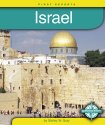
Israel (First Reports)
By Susan H. Gray
Begins with a descriptive passage about the land in question and then presents a map that shows the country in a regional context. The photographs offer appealing scenery and smiling residents engaged in work or recreational activities.
Description from School Library Journal
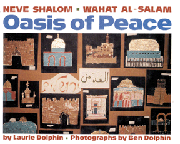
Neve Shalom
Wahat Al-Salam
Oasis of Peace
By Laurie Dolphin
In a remarkable community outside Jerusalem, 20 families--Jews and
Arabs--demonstrate the possibility of peaceful coexistence, working
and living together in a cooperative village that is seen here
through the eyes of two ten-year-olds, a Jewish boy and an Arab,
among the first from outside the village to be admitted to its bilingual,
bicultural school. Dolphin clearly shows not only the differences between
the boys' family lives and customs but also their many similarities, and
provides a succinct explanation of Israel's status as the Jewish homeland
and of the conflict that has riven the country since its founding. The
text is concise yet inspiring, showing the boys--wary at first--learning
about each other's history, beliefs, and languages and becoming friends.
Also included is background information about the village, as well as
about Israel's history and the diversity of its land and population. The
many color photos are so tightly integrated with the text that captions
are unnecessary; fittingly, an olive branch is the decorative motif
throughout.
Description from Kirkus Reviews
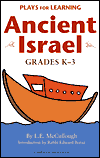
Plays of Ancient Israel:
Legends from the Bible and Jewish Folklore for Grades K-3
By L. E. McCullough
The land of Israel has long been a fertile spawning ground for some of the greatest stories ever told - which are now dramatized for your stage! Plays of Ancient Israel presents 12 exciting one-acts from the Old Testament and the treasure trove of Jewish folklore and ritual: Noah, Moses, Jonah, Samson & Delilah, David & Goliath, Ruth and Naomi, King Solomon, tales from the Talmud, origins of Hanukkah, Purim and more.
Description from Publisher
Though the title suggests that these dramatic interpretations of Bible stories and legends from the Midrash target children in grades K to three, the sophistication of the dialogue and plots make them more suitable for older students. The works range from a retelling of the story of Jonah to a less widely known adventure of Elijah the prophet. The text assumes its audience will be familiar with biblical narrative; for example, a character at the end of the tale of Ruth and Naomi comments that Ruth will give birth to a child renowned throughout Israel without making it clear that she is an ancestor of King David. The adults in charge of the productions will appreciate the clear stage directions and flexible casting requirements. For example, a story about angels on earth calls for a 21-member cast, but the play may be performed with 6 boys and 3 girls. Children will appreciate the modern humor injected into standard Sunday-school fare. When Jonah realizes that he has brought God's anger upon the ship he comments, "I was afraid this might happen, but that's the way the prophet bounces." A note outlines each story's origin. A diagram of the stage set; music scores; and descriptions of the set, cast, music, props, and costumes accompany each selection. A good choice for adults looking for a way to enliven religious-school curriculum
Description from School Library Journal

Israel Is
By Susan Remick Topek
Old & new cities, sandy deserts, tall mountains, salty seas,
many people, Shalom!
Description from Publisher

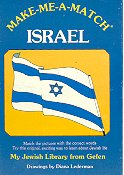
Make Me a Match:
Israel
By Diana Lederman
Match the pictures with the correct words. Itís a game, a book and a learning tool. An exciting way for kids to learn about Jewish life & holidays. Full color in Hebrew, English and transliterated English.
Description from Publisher
Page 1 |
Page 2
Still can't find what you're looking for? Search Amazon.com's database directly.
©1999-2006
(NOTE: The following links have NOT been placed on the site by the website owners. We have no control over which ads are selected and are not responsible for their religious content.)
For videos of the Israeli version of Sesame Street go to the Shalom Sesame Video Page
For history books for older readers go to the Israel and Israeli History Books for Older Readers Page
For Israeli historical fiction for older readers go to the Israeli Historical Fiction Books Page
If this page came up without frames, Click here to see the complete website
Other Pages of Interest:
Israel Books for Children (Page 1) |
(Page 2)
Easy Reader and Picture Books:
Jewish Children's Books (General) |
Jewish Board Books |
Biblical Stories for Children |
Jewish Holiday Books |
Jewish Family Cookbooks |
Folktales and Talmudic Stories for Children |
Jewish Life Books (Mitzvot, Keeping Kosher, etc.) |
Jewish Life Cycle Books |
Family Haggadahs |
Children's Prayerbooks |
Introductory Hebrew Books |
Jewish History and Historical Fiction Picture Books |
Israel Books
Middle School and YA Books:
Bar Mitzvah Books |
Jewish Fiction |
Historical Fiction |
Torah Study |
Prayer and Jewish Life Books |
Jewish Holidays |
Jewish Biographies |
Jewish History Books |
Holocaust Books for Teens |
Israel Books
And More ...
Jewish Books for Children |
Bar Mitzvah Books |
Jewish Parenting Books |
Hanukkah Books |
Jewish Music for Children |
Jewish Videos |
Jewish Toys and Gifts |
Jewish Gift Baskets and Gourmet Food |
Jewish Jewelry |
Amazon.com Coupons, Promotions, and Sales
Other Pages of Interest:
Israel Books for Children (Page 1) |
(Page 2)
Easy Reader and Picture Books:
Jewish Children's Books (General) |
Jewish Board Books |
Biblical Stories for Children |
Jewish Holiday Books |
Jewish Family Cookbooks |
Folktales and Talmudic Stories for Children |
Jewish Life Books (Mitzvot, Keeping Kosher, etc.) |
Jewish Life Cycle Books |
Family Haggadahs |
Children's Prayerbooks |
Introductory Hebrew Books |
Jewish History and Historical Fiction Picture Books |
Israel Books
Middle School and YA Books:
Bar Mitzvah Books |
Jewish Fiction |
Historical Fiction |
Torah Study |
Prayer and Jewish Life Books |
Jewish Holidays |
Jewish Biographies |
Jewish History Books |
Holocaust Books for Teens |
Israel Books
And More ...
Jewish Books for Children |
Bar Mitzvah Books |
Jewish Parenting Books |
Hanukkah Books |
Jewish Music for Children |
Jewish Videos |
Jewish Toys and Gifts |
Jewish Gift Baskets and Gourmet Food |
Jewish Jewelry |
Amazon.com Coupons, Promotions, and Sales
Easy Reader and Picture Books:
Jewish Children's Books (General) | Jewish Board Books | Biblical Stories for Children | Jewish Holiday Books | Jewish Family Cookbooks | Folktales and Talmudic Stories for Children | Jewish Life Books (Mitzvot, Keeping Kosher, etc.) | Jewish Life Cycle Books | Family Haggadahs | Children's Prayerbooks | Introductory Hebrew Books | Jewish History and Historical Fiction Picture Books | Israel Books
Middle School and YA Books:
Bar Mitzvah Books | Jewish Fiction | Historical Fiction | Torah Study | Prayer and Jewish Life Books | Jewish Holidays | Jewish Biographies | Jewish History Books | Holocaust Books for Teens | Israel Books
And More ...
Jewish Books for Children | Bar Mitzvah Books | Jewish Parenting Books | Hanukkah Books | Jewish Music for Children | Jewish Videos | Jewish Toys and Gifts | Jewish Gift Baskets and Gourmet Food | Jewish Jewelry | Amazon.com Coupons, Promotions, and Sales
 Shalom, Salaam, Peace by Howard Bogot |
An illustrated poem, presented in English, Hebrew, and Arabic,
examining the meaning and benefits of peace.
This unique and beautiful children's book is a poetic, evocative call
for peace in the Middle East - and everywhere.
|
 Imagine...Exploring Israel |
|
 On the Wings of Eagles : An Ethiopian Child's Story |
A Jewish Ethiopian boy recounts the story of Israel's 1991 airlift rescue of his threatened people.
|
 When I Left My Village |
This companion to Schur's Day
of Delight follows a family of Ethiopian
Jews (the Beta Israel) in their escape from drought and persecution. Traveling
at night on foot through mountains, plains, and desert, 12-year-old Menelik,
his parents, and younger brother head for a Sudanese refugee camp. From
there, the people are airlifted to Israel; given homes, clothing, and food; and
assimilated into a culture that offers them freedom, safety, and equality. The
boy tells the story of the perilous journeyof days filled with hunger, fear of
discovery, and death; of a furtive border crossing; of weeks of unsanitary
living in the crowded camp; and, finally, of resettlement in a small white hut
in the hills near Jerusalem. The book reads like a true adventure story. Pinkney's
full-page, black-and-white scratchboard illustrations add reality to this
fictionalized account of the recent rescue mission that saved the remnants of
a little-known civilization. A map of the Middle East shows the family's escape
route, and an author's note adds historical information.
Winner of The Sydney Taylor Award (The Association of Jewish Libraries) |
 My Name Is Rachamim |
Rachamim and his family, Jews suffering from discrimination in Ethiopia,
are forced to flee the country and finally make it to a new home in Israel.
|
 And Shira Imagined |
As Shira and her parents travel around Israel, her parents remind her of the
significance of each site, which she interprets in her own way: when told
that busy, modern Tel Aviv was only sand and dust 80 years ago, Shira
pictures herself and some toy-like creatures building sandcastles; when
she hears that the old fortress, Masada, was the place where the Jews
clashed with the Romans, Shira imagines a playful battle. A historical
theme is not strictly adhered to; at one point her parents point out the
Red Sea, saying, "Just imagine, we'll be looking at thousands of fish and
swimming with them.'' In the final frame, Shira envisions her bedroom back
in America, where the cast of her imagination awaits herher toys.
Black-and-white pictures of modern Israel alternate with the full-color
fantasies. The language of the telling is simple and straightforward; this
complements the elaborate pictures from Carmi's own fanciful imagination.
|
 Snow in Jerusalem By Deborah Da Costa |
In her affecting but message-driven debut children's book, da Costa relays the story of
two boys who live in Jerusalem's Old City Avi in the Jewish Quarter and Hamudi in the
Muslim Quarter. A fluffy white cat wanders between the homes of the two boys, relishing
the scraps each feeds her. Then weeks pass without any sign of the cat, alarming each boy.
Looking skinny and dirty, the cat at last visits Avi, who then follows her to Hamudi's
neighborhood, where the youngsters begin to argue, each claiming the cat is his. As a
rare snowfall begins, the boys stop bickering and, fearing that the beloved animal will
freeze, follow her through Jerusalem to a dark alley where they discover four kittens in
a box. As the mother purrs loudly and rubs against the boys, they conclude, "She does not
want us to fight.... She wants peace." The watercolor art by this husband-and-wife team
(Mei-Mei Loves the Morning) balances precise, close-up portraits of the boys with softly
focused backgrounds that depict the various cultural nuances of the setting. A glossary
defines the Hebrew and Arabic words integrated into the text.
Although this story is set in contemporary Jerusalem, a holy place to Muslims, Jews, and Christians, it is more about politics than faith. On its simplest level, it's the story of two boys, one Jewish, one Muslim, who squabble over a stray cat to which they've both become attached. Their argument heats up when they discover the cat has had kittens. Eventually their anger gives way to reason: each boy takes two babies, and mother cat is left free to roam between the neighborhoods to care for the kits, now safely off the street. Older children with some knowledge of Middle East politics, either from listening to the news or talking about the discord in secular or religious schools, will catch the deeper meaning. The idea that deeply rooted conflicts can as easily be resolved is unquestionably simplistic, but the book's optimism is appealing. The realistically executed watercolor art catches the strong emotional content of the argument and conveys enough detail in dress and setting to establish the boys' cultural background while still making them part of the modern world. As the problems in the Middle East continue to rage, this didactic story of finding common ground and a way to make peace seems both simplistic and apropos. Both Avi, who lives in the Jewish Quarter of Jerusalem, and Hamudi, from the Muslim Quarter, love the white stray cat they feed. After she disappears and reappears, Avi follows the feline and discovers Hamudi feeding her. As they argue about ownership, snow begins to fall, and she runs away. Predictably, when they find her, she has four new kittens, which they argue over and finally agree to share, each taking two of them home. The narrative flows smoothly, and da Costa's language makes the story seem more a legend or folktale than a modern tale. The watercolor-and-pencil illustrations are done in a realistic style that suits the narrative, but the boys look alike except for their different jackets and the fact that Avi wears a yarmulke. The endpapers, which depict the old city with the Wailing Wall and the Dome of the Rock practically touching, are quite effective. School libraries may want to consider this serviceable title for opening discussions about the Middle East. |
 Israel (First Reports) By Susan H. Gray |
Begins with a descriptive passage about the land in question and then presents a map that shows the country in a regional context. The photographs offer appealing scenery and smiling residents engaged in work or recreational activities.
|
 Neve Shalom Wahat Al-Salam Oasis of Peace By Laurie Dolphin |
In a remarkable community outside Jerusalem, 20 families--Jews and
Arabs--demonstrate the possibility of peaceful coexistence, working
and living together in a cooperative village that is seen here
through the eyes of two ten-year-olds, a Jewish boy and an Arab,
among the first from outside the village to be admitted to its bilingual,
bicultural school. Dolphin clearly shows not only the differences between
the boys' family lives and customs but also their many similarities, and
provides a succinct explanation of Israel's status as the Jewish homeland
and of the conflict that has riven the country since its founding. The
text is concise yet inspiring, showing the boys--wary at first--learning
about each other's history, beliefs, and languages and becoming friends.
Also included is background information about the village, as well as
about Israel's history and the diversity of its land and population. The
many color photos are so tightly integrated with the text that captions
are unnecessary; fittingly, an olive branch is the decorative motif
throughout.
|
 Plays of Ancient Israel: Legends from the Bible and Jewish Folklore for Grades K-3 By L. E. McCullough |
The land of Israel has long been a fertile spawning ground for some of the greatest stories ever told - which are now dramatized for your stage! Plays of Ancient Israel presents 12 exciting one-acts from the Old Testament and the treasure trove of Jewish folklore and ritual: Noah, Moses, Jonah, Samson & Delilah, David & Goliath, Ruth and Naomi, King Solomon, tales from the Talmud, origins of Hanukkah, Purim and more.
Though the title suggests that these dramatic interpretations of Bible stories and legends from the Midrash target children in grades K to three, the sophistication of the dialogue and plots make them more suitable for older students. The works range from a retelling of the story of Jonah to a less widely known adventure of Elijah the prophet. The text assumes its audience will be familiar with biblical narrative; for example, a character at the end of the tale of Ruth and Naomi comments that Ruth will give birth to a child renowned throughout Israel without making it clear that she is an ancestor of King David. The adults in charge of the productions will appreciate the clear stage directions and flexible casting requirements. For example, a story about angels on earth calls for a 21-member cast, but the play may be performed with 6 boys and 3 girls. Children will appreciate the modern humor injected into standard Sunday-school fare. When Jonah realizes that he has brought God's anger upon the ship he comments, "I was afraid this might happen, but that's the way the prophet bounces." A note outlines each story's origin. A diagram of the stage set; music scores; and descriptions of the set, cast, music, props, and costumes accompany each selection. A good choice for adults looking for a way to enliven religious-school curriculum |
 Israel Is By Susan Remick Topek |
Old & new cities, sandy deserts, tall mountains, salty seas,
many people, Shalom!
|

Make Me a Match: Israel By Diana Lederman |
Match the pictures with the correct words. Itís a game, a book and a learning tool. An exciting way for kids to learn about Jewish life & holidays. Full color in Hebrew, English and transliterated English.
|